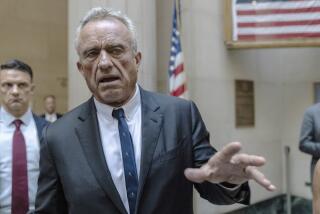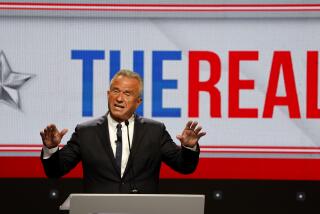Kerry Is in Command, but Also-Rans Keep on Running
- Share via
ALEXANDRIA, Va. — You’ve spent millions of dollars of other people’s money, and you need more fast; lots more, really fast.
You can count the number of primaries you’ve won on your nose. The front-runner needs all his fingers and a couple toes to accomplish the same feat.
The logical thing to do is bow out. You don’t.
What could you possibly be thinking?
You’re thinking that Sen. John F. Kerry of Massachusetts (12-2 in nominating contests so far) might stumble sometime in the near future. You’re thinking that voters might get buyer’s remorse and cool toward the man with the white-hot trajectory -- hopefully in time to do you some good.
Your higher self believes that voters deserve a contest, not a coronation. Your inner optimist thinks you can still win. Your inner pragmatist is eyeing the No. 2 spot.
If you’re John Edwards, the senator who won the South Carolina primary last week, your campaign manager says you’re still a viable candidate -- even if you lost in Tennessee and Virginia on Tuesday, even if you don’t win in Wisconsin, next week’s prize.
“Our goal all along has been to beat [retired Gen. Wesley K.] Clark,” Nick Baldick, Edwards’ campaign manager, said Tuesday. “We’ve said that all week.”
Edwards accomplished that goal, finishing second in Virginia and Tennessee, while Clark ran third. And late Tuesday night, Clark decided to end his candidacy, the same day he had told Tennessee voters that 14 primaries and caucuses do not a nominee make.
“The momentum of the campaign is just sweeping everybody through all this, without them really knowing the candidates,” Clark said Tuesday morning, campaigning at a Nashville coffee shop. “If we do that and that carries through, what is going to happen is buyer’s remorse.”
Then there’s Howard Dean. First he threatened to bail if he didn’t win the Wisconsin primary next Tuesday. But on Monday the former Vermont governor announced he’d stay in the race beyond Wisconsin, no matter the results, because of “enormous pressure” from supporters clamoring for him to fight on.
The question, of course, is whether the Edwards and Dean campaigns will still matter. If history is any teacher, the answer is probably no.
After all, the last man to take Iowa and New Hampshire -- as Kerry did last month -- but lose the nomination was Maine Sen. Edmund S. Muskie. That was 1972, and Muskie lost the nomination to South Dakota Sen. George McGovern.
Muskie’s fortunes faded fast after New Hampshire; Kerry shows no signs of flagging.
The evidence? Robinson Secondary School in Fairfax, Va., where a Tuesday afternoon precinct visit morphed into a Kerry rally, all schoolchildren singing show tunes, mothers thrusting babies at the tall, craggy candidate, two hundred supporters clamoring for a handshake, an autograph, an audience, anything.
Kerry was loath to suggest that his rivals, for the good of the party, should bow out of the race. Pressed on the matter as he stood on the tarmac of Washington-Dulles International Airport, Kerry said he respected “each state’s right to make its decisions, and I respect each candidate’s right to make their decisions.”
“It’s not appropriate for me to be giving anybody advice,” he said. “I’m simply going to campaign from state to state as I am today.”
Kerry might give his opponents wide berth, but others will be pressuring Edwards and Dean to drop out now that Kerry has proven his strength in every region of the country, said Tim Hibbitts, a Democratic pollster in Portland, Ore.
If Edwards prolongs the fight, as he has promised, the North Carolina senator could continue to burnish his national political image -- as long as he doesn’t damage Kerry in the process. But the sooner the fight ends, and the sooner Kerry gets off the road, the better off the Democrats will be in the fall, Hibbitts said.
“The ideal circumstance would be for the campaign to go subterranean for a while and give Kerry a chance to rest up,” Hibbitts said. “I don’t see a great positive in taking a 60-year-old man and dragging him all over the country for several more weeks.”
Stuart Rothenberg, editor of a nonpartisan political newsletter, begs to differ. If other candidates stay in the race, he said, the media have to treat it as a race, have to cover the candidates and air their attacks. So far, the worst of those broadsides largely have been focused on the man who lives at 1600 Pennsylvania Ave.
Under this scenario, “Kerry will get more attention,” Rothenberg said. “If the attacks are on the president, the Democratic message is echoed. Once they exit the race, we heave a big sigh and focus on the general election.”
If Kerry is one of the last guys who would question why any candidate would bother staying in the Democratic race, David Wade, the senator’s press secretary, is right there with him at the end of the line. Wade was at Kerry’s side when, during much of last year and into 2004, he was widely viewed as an also-ran who had run a poor campaign.
Kerry was asked not much more than a month ago why he bothered to stay in the hunt, when polls indicated Dean was the clear front-runner.
“So we’ve learned not to question the judgments that other candidates have to make,” Wade said.
“It’s such an intensely personal decision. You can only make it on your own. We know that better than anyone.”
Times staff writers Eric Slater and James Rainey contributed to this report.
More to Read
Get the L.A. Times Politics newsletter
Deeply reported insights into legislation, politics and policy from Sacramento, Washington and beyond. In your inbox twice per week.
You may occasionally receive promotional content from the Los Angeles Times.












